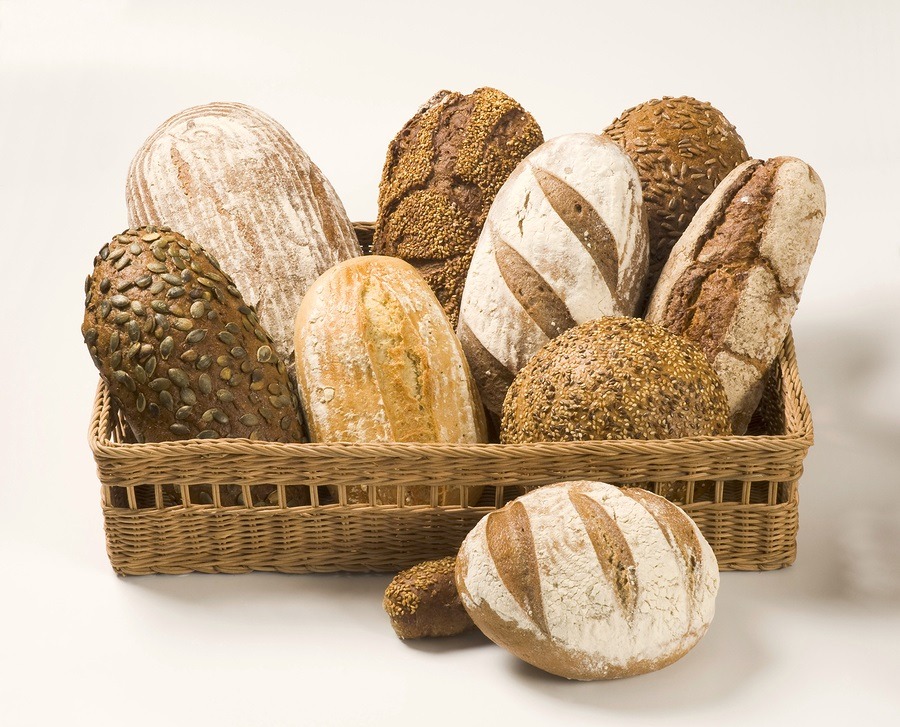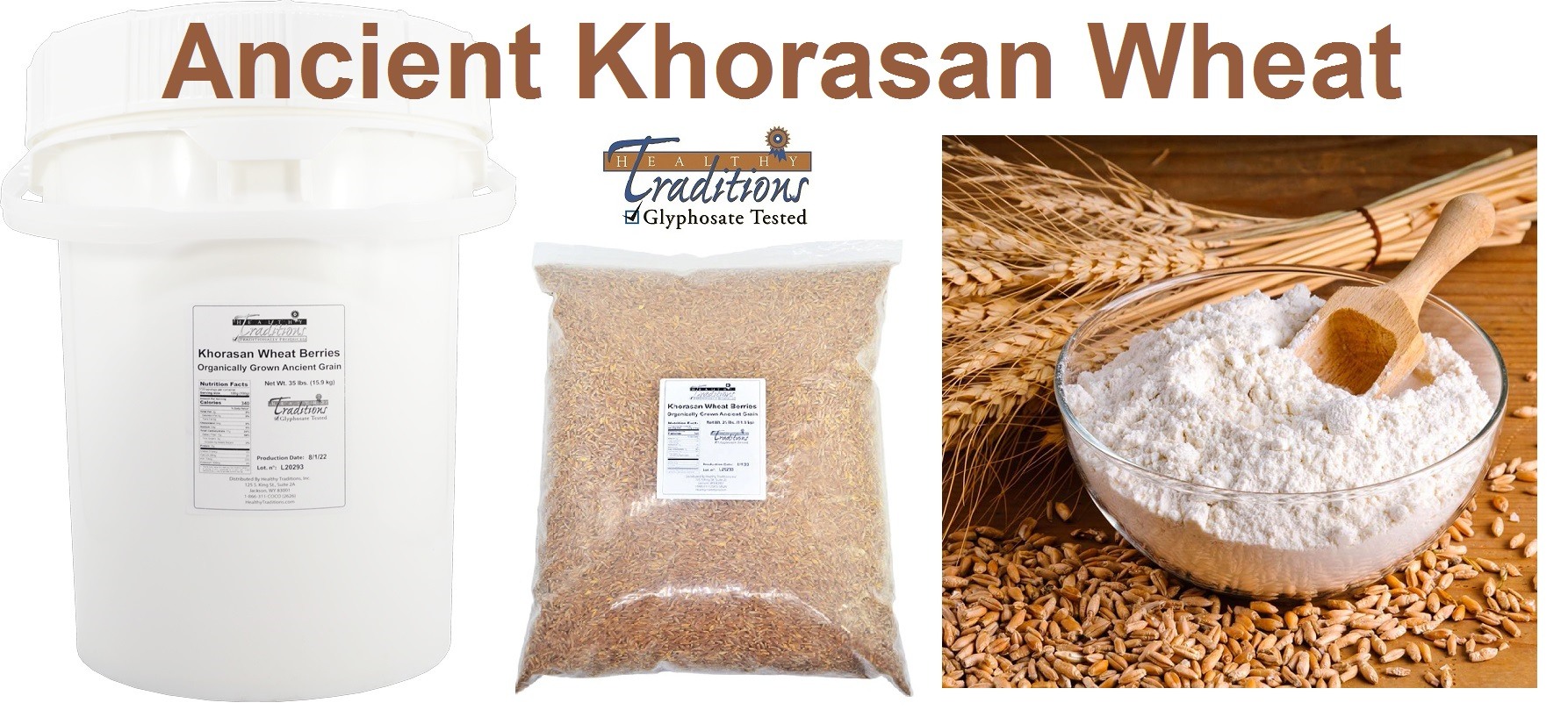by Brian Shilhavy
Editor, Health Impact News
There has been a resurgence in interest in ancient grains in recent years, as more and more people begin to realize just how toxic modern wheat products are, with many “gluten intolerance” diseases increasing in modern times.
Unfortunately, ancient grains grown in the United States, along with all other grains such as wheat, oats, and barley, are almost all contaminated by modern pesticides and herbicides, even if they are certified organic.
We published a report on an investigation I conducted in 2014 by testing both organic and conventional products made from American (both the U.S. and Canada) grains, and we found very little difference between organic and conventional grains in terms of being contaminated with glyphosate, the active ingredient in the world's most popular herbicide, RoundUp, which has been linked to cancer and other diseases. See:
ALERT: Certified Organic Food Grown in U.S. Found Contaminated with Glyphosate Herbicide
Also:
Almost all American Grains Are Contaminated with Glyphosate Herbicide
How Glyphosate Herbicide Has Destroyed America’s Wheat
New Tests Confirm Children’s Foods Made from Oats are ALL Contaminated with Cancer-Causing Glyphosate
Herbicide Glyphosate Found in Organic Eggs and Dairy
Contamination of U.S. Food Supply Worsens as 50% of Foods Tested Contained Cancer-Causing Glyphosate Herbicide
Most Beers and Wines Tested are Contaminated with Glyphosate
Study: 99% of Canadian Honey Analyzed Contaminated with Herbicide Glyphosate
We started testing ALL of the food we sell in our online store, Healthy Traditions, at that time, and stopped selling the organic grains we had in stock that tested positive for glyphosate.
So today, we do not even purchase, let alone sell, any foods that have not first been tested for the harmful herbicide glyphosate.
When we began to search for sources for ancient grains, all the ones we found at the time tested positive for glyphosate, which forced us to begin searching for glyphosate-free grains outside the U.S. We found that Italy had the cleanest ancient grains which consistently tested negative for glyphosate, and we found some organic, heirloom corn that tested clean in Central Mexico, where glyphosate was banned.
What shocked us the most is that farmers in America who were growing these organic grains were most certainly NOT spraying them with glyphosate, even though it is a common practice in conventional farms, where they want to use glyphosate to kill the wheat so that they could harvest it before the first snow fall, ensuring that they could harvest their entire crop first.
So even through the organic farms were not spraying their crops with glyphosate, it was obviously “drifting” to nearby farms. We have never been able to test any grains free from glyphosate in the northern states of Montana and the Dakotas, nor in Canada.
We eventually found a source of Khorasan Wheat from a single farm in Italy, and sold that for a few years.
But their harvest in 2023 was not successful, leaving us with very little left in stock from the year before.
But we recently just found a farm in Washington State that grew Khorasan in 2023, and samples from their field tested clean for any glyphosate. I proceeded to purchase many tons of this product, and we now have it in stock as a whole grain which you can purchase in bulk, as well as a whole grain flour.
There are other Khorasan products sold in the U.S., most of them under the trademarked name “Kamut”, but they make no claim to having tested their grains for the presence of glyphosate, and most of it seems to be grown in Montana where we have never tested any grain to be free from glyphosate.
The Health Benefits of Khorasan Wheat

Khorasan Wheat is an ancient grain that hasn’t been hybridized in modern history. The source of this grain is traced back to the Fertile Crescent in the Middle East, and the Khorasan regions of Iran and Afghanistan.
Khorasan is thought to be a close relative of durum wheat. It is a tetraploid, which means it is a cross of two ancient diploid grasses and has 4 chromosome sets.
The berry of Khorasan Wheat is roughly twice the size of modern wheat varieties and the flavor is described as rich and nutty.
Khorasan Wheat is an excellent source of protein, fiber, zinc, phosphorus, magnesium, vitamin B1 (thiamin), and vitamin B3 (niacin). It is also high in many minerals such as selenium, copper, manganese, and molybdenum.
Khorasan Wheat contains several polyphenols that have strong antioxidant and anti-inflammatory properties. It is particularly high in carotenoids, which likely gives the Khorasan grain and flour its rich golden color.
Here are some studies published in the peer-reviewed literature on the health benefits of Khorasan Wheat, conducted mainly by researchers in Italy.
Effect of ancient Khorasan wheat on gut microbiota, inflammation, and short-chain fatty acid production in patients with fibromyalgia
Abstract
Background: Fibromyalgia (FM) syndrome is mainly characterized by widespread pain, sleeping disorders, fatigue, and cognitive dysfunction. In many cases, gastrointestinal distress is also reported, suggesting the potential pathogenic role of the gut microbiota (GM). The GM is deeply influenced by several environmental factors, especially the diet, and recent findings highlighted significant symptom improvement in FM patients following various nutritional interventions such as vegetarian diet, low-fermentable oligosaccharides, disaccharides, monosaccharides, and polyols based diets, gluten-free diet, and especially an ancient grain supplementation. In particular, a recent study reported that a replacement diet with ancient Khorasan wheat led to an overall improvement in symptom severity of FM patients.
Aim: To examine the effects of ancient Khorasan wheat on the GM, inflammation, and short-chain fatty acid production in FM patients.
Methods: After a 2-wk run-in period, 20 FM patients were enrolled in this randomized, double-blind crossover trial. In detail, they were assigned to consume either Khorasan or control wheat products for 8 wk and then, following an 8-wk washout period, crossed. Before and after treatments, GM characterization was performed by 16S rRNA sequencing while the fecal molecular inflammatory response and the short-chain fatty acids (SCFAs) were respectively determined with the Luminex MAGPIX detection system and a mass chromatography-mass spectrometry method.
Results: The Khorasan wheat replacement diet, in comparison with the control wheat diet, had more positive effects on intestinal microbiota composition and on both the fecal immune and SCFAs profiles such as the significant increase of butyric acid levels (P = 0.054), candidatus Saccharibacteria (P = 9.95e-06) and Actinobacteria, and the reduction of Enterococcaceae (P = 4.97e-04). Moreover, the improvement of various FM symptoms along with the variation of some gut bacteria after the Khorasan wheat diet have been documented; in fact we reported positive correlations between Actinobacteria and both Tiredness Symptoms Scale (P < 0.001) and Functional Outcome of Sleep Questionnaire (P < 0.05) scores, between Verrucomicrobiae and both Widespread Pain Index (WPI) + Symptom Severity scale (SS) (P < 0.05) and WPI (P < 0.05) scores, between candidatus Saccharibacteria and SS score (P < 0.05), and between Bacteroidales and Sleep-Related and Safety Behaviour Questionnaire score (P < 0.05).
Conclusion: The replacement diet based on ancient Khorasan wheat results in beneficial GM compositional and functional modifications that positively correlate with an improvement of FM symptomatology.
A khorasan wheat-based replacement diet improves risk profile of patients with type 2 diabetes mellitus (T2DM): a randomized crossover trial
Abstract
Purposes: The aim of the present study was to examine whether a replacement diet with products made with organic ancient khorasan wheat could provide additive protective effects in reducing glucose, insulin, lipid and inflammatory risk factors, and in restoring blood redox balance in type 2 diabetes mellitus (T2DM) patients compared to diet with product made with modern organic wheat.
Methods: We conducted a randomized, double-blinded crossover trial with two intervention phases on 21 T2DM patients (14 females, 7 males). The participants were assigned to consume products (bread, pasta, crackers and biscuits) made using semi-whole flour from organic wheat that was either from ancient khorasan wheat or modern control wheat for 8 weeks in a random order. An 8-week washout period was implemented between the interventions. Laboratory analyses were performed both at the beginning and at the end of each intervention phase.
Results: The metabolic risk profile improved only after the khorasan intervention period, as measured by a reduction in total and LDL cholesterol (mean reduction: -3.7 and -3.4 %, respectively), insulin (-16.3 %) and blood glucose (-9.1 %). Similarly, there was a significant reduction in circulating levels of reactive oxygen species (ROS), vascular endothelial growth factor (VEGF) and interleukin-1ra, and a significant increase of total antioxidant capacity (+6.3 %). No significant differences from baseline were noted after the modern control wheat intervention phase. The change (from pre- to post-intervention) between the two intervention arms was significantly different (p < 0.05) for total and LDL-c, insulin and HOMA index.
Conclusions: A replacement diet with ancient khorasan wheat consumption provided additive protection in reducing total and LDL cholesterol, insulin, blood glucose, ROS production, and some inflammatory risk factors, which are all key factors warranting of control in secondary prevention of T2DM compared to a diet with products made with modern wheat.
An organic khorasan wheat-based replacement diet improves risk profile of patients with acute coronary syndrome: a randomized crossover trial
Abstract
Khorasan wheat is an ancient grain with previously reported health benefits in clinically healthy subjects. The aim of this study was to examine whether a replacement diet, thereby substituting all other cereal grains, with products made with organic khorasan wheat could provide additive protective effects in reducing lipid, oxidative and inflammatory risk factors, in patients with Acute Coronary Syndromes (ACS) in comparison to a similar replacement diet using products made from organic modern wheat.
A randomized double-blinded crossover trial with two intervention phases was conducted on 22 ACS patients (9 F; 13 M). The patients were assigned to consume products (bread, pasta, biscuits and crackers) made either from organic semi-whole khorasan wheat or organic semi-whole control wheat for eight weeks in a random order.
On average, patients ingested 62.0 g dry weight (DW) day-1 khorasan or control semolina; and 140.5 g DW day-1 khorasan or control flour, respectively. An eight-week washout period was implemented between the respective interventions.
Blood analyses were performed both at the beginning and end of each intervention phase; thereby permitting a comparison of both the khorasan and control intervention phases, respectively, on circulatory risk factors for the same patient. Consumption of products made with khorasan wheat resulted in a significant amelioration in total cholesterol (-6.8%), low-density lipoprotein cholesterol (LDL-C) (-8.1%) glucose (-8%) and insulin (-24.6%) from baseline levels, independently of age, sex, traditional risk factors, medication and diet quality.
Moreover, there was a significant reduction in reactive oxygen species (ROS), lipoperoxidation of circulating monocytes and lymphocytes, as well as in the levels of Tumor Necrosis Factor-alpha. No significant differences from baseline in the same patients were observed after the conventional control wheat intervention phase.
The present results suggest that a replacement diet with cereal products made from organic khorasan wheat provides additional protection in patients with ACS. Circulating cardiovascular risk factors, including lipid parameters, and markers of both oxidative stress and inflammatory status, were reduced, irrespective of the number and combination of medicinal therapies with proven efficacy in secondary prevention.
To learn more about the damaging effects of glyphosate which is in most of the North American food supply, see:
Is Glyphosate Responsible for your Health Problems?
Gluten Intolerance and the Herbicide Glyphosate: A National Epidemic
The Microbiota Crisis: How the Herbicide Glyphosate is Killing Microbiomes
Would you like to invest in glyphosate-tested and GMO-tested food and become a Reseller or Distributor?
We still have some openings left. See:
Healthy Traditions Offers Up to a 20% Return on a $1000 Investment and Up to a 30% Return for $5000 Investment to Become Resellers of Long-term Storable Food Tested for GMOs and other Toxins

See Also:
Understand the Times We are Currently Living Through
The United States and The Beast: A look at Revelation in Light of Current Events Since 2020
Exposing the Christian Zionism Cult
Insider Exposes Freemasonry as the World’s Oldest Secret Religion and the Luciferian Plans for The New World Order

Identifying the Luciferian Globalists Implementing the New World Order – Who are the “Jews”?
Who are the Children of Abraham?
The Brain Myth: Your Intellect and Thoughts Originate in Your Heart, Not Your Brain
Fact Check: “Christianity” and the Christian Religion is NOT Found in the Bible – The Person Jesus Christ Is
Young Man Living on the Streets Finds Jesus of the Bible – Overcomes Drug and “Terminally Online” Addictions
COVID “Vaccine” Injured Muslim Man Learns COVID was a Scam and Meets Jesus of the Bible as he Begins to Heal
How to Determine if you are a Disciple of Jesus Christ or Not
The Seal and Mark of God is Far More Important than the “Mark of the Beast” – Are You Prepared for What’s Coming?
The Satanic Roots to Modern Medicine – The Mark of the Beast?
Medicine: Idolatry in the Twenty First Century – 8-Year-Old Article More Relevant Today than the Day it was Written
Having problems receiving our emails? See:
How to Beat Internet Censorship and Create Your Own Newsfeed
We Are Now on Telegram. Video channels at Bitchute, and Odysee.
If our website is seized and shut down, find us on Telegram, as well as Bitchute and Odysee for further instructions about where to find us.
If you use the TOR Onion browser, here are the links and corresponding URLs to use in the TOR browser to find us on the Dark Web: Health Impact News, Vaccine Impact, Medical Kidnap, Created4Health, CoconutOil.com.
Source link
















